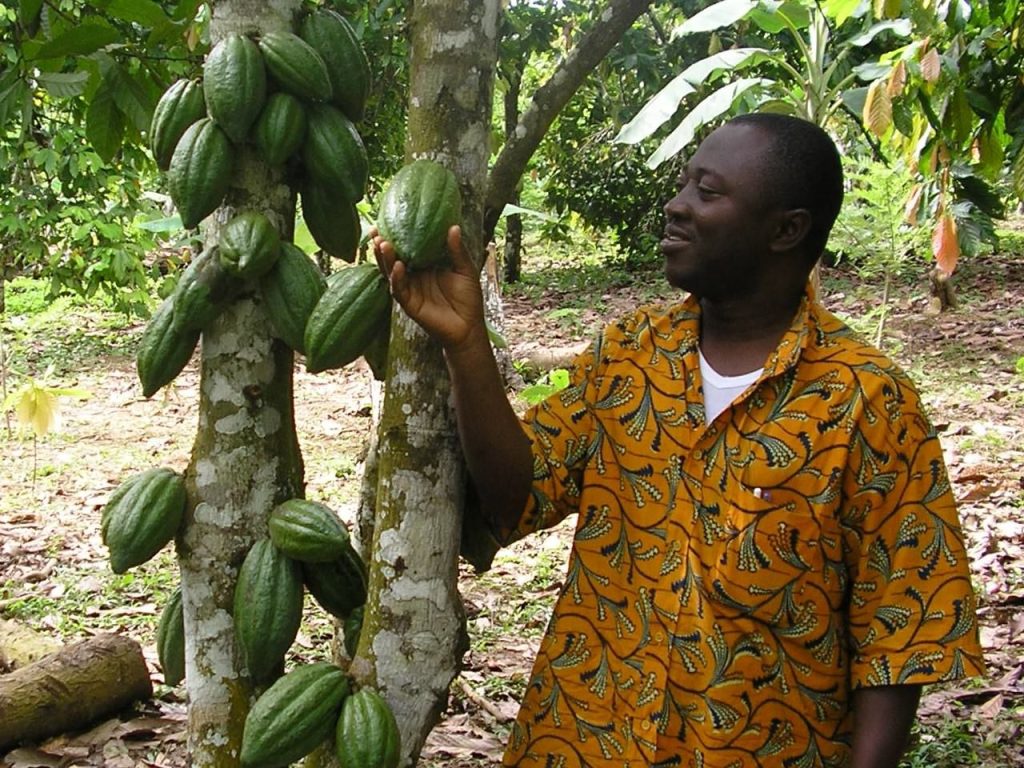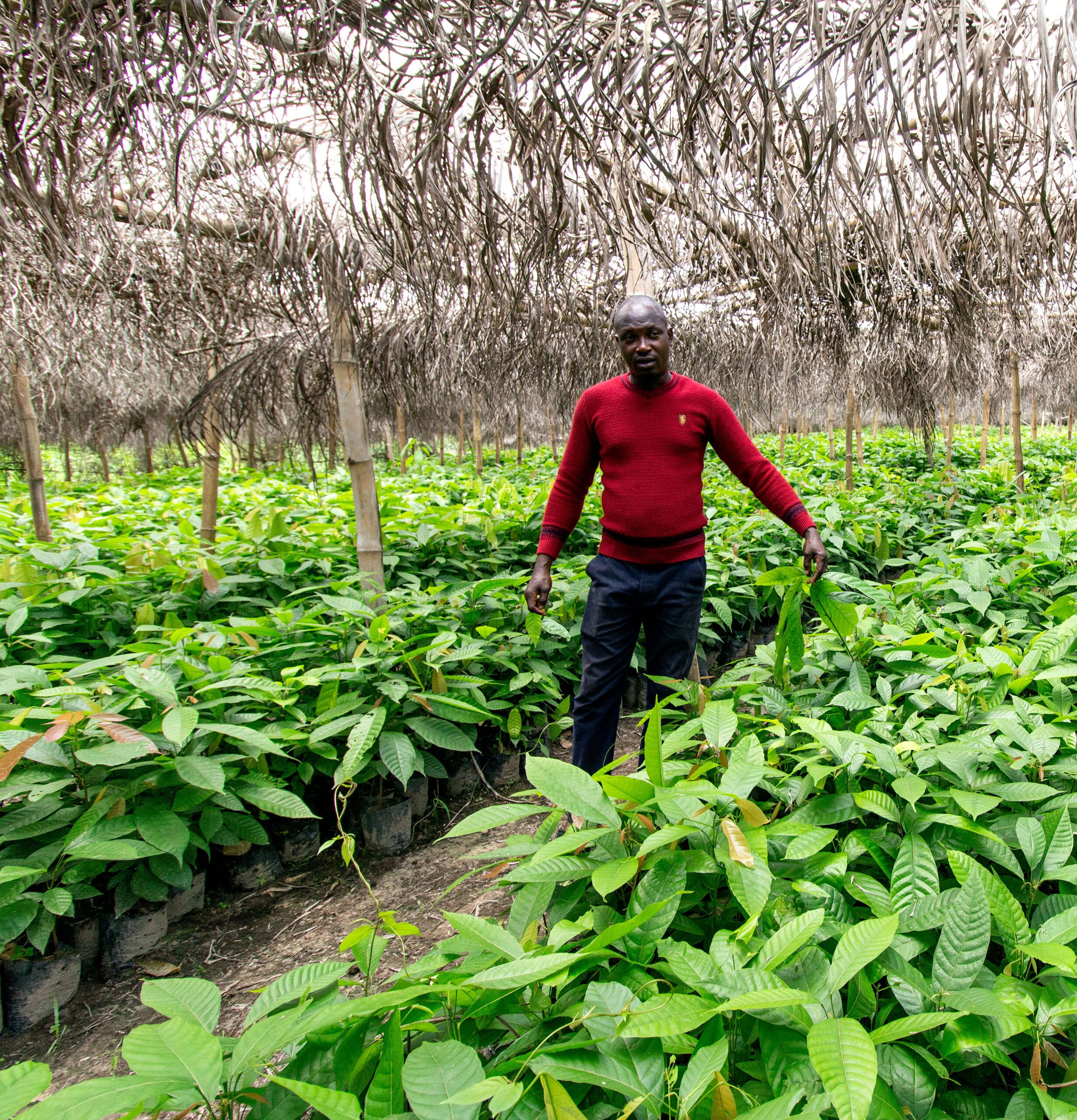Innovative Ways to Enhance Living Income for Cocoa Farmers
4 min read
Despite producing much of the world’s cocoa, it is estimated that about 87 percent of cocoa-growing households in Côte d’Ivoire earn below a living income. At the Rainforest Alliance, we believe cocoa and chocolate companies should go further to ensure farmers and their families are able to thrive and invest in the future of their farms. This shared responsibility approach is embodied in our certification program. It was also the basis for our Living Income pilot, and its next iteration: the Living Income Fund.
In 2021, the Rainforest Alliance partnered with IKEA Social Entrepreneurship, Cloetta, farmer connect (FC) and the German Agency for International Cooperation (GIZ) to pilot ways to enhance living income for farmers from two cooperatives in the Abengourou region of Côte d’Ivoire.
A key part of this pilot was establishing a direct connection between companies and the farmers they source from. Together with FC, we created a platform that verifies that company contributions are reaching participating cocoa farmers. This tool also featured a feedback loop for farmers to confirm cash transfers and provide input. IKEA Social Entrepreneurship and Cloetta provided grants for cash transfers and agricultural services, like weeding and pruning.
“At Cloetta, we are inspired to participate in this pilot project. Firstly, to support the farmers, and secondly to bring our consumers closer to the people growing their chocolate bars.”
Maria Selling, Cloetta’s sustainability manager
The proven benefits of cash transfers
A large body of evidence shows that cash transfers have positive impacts for farming communities, including better school attendance for their children, more food security, improved access to healthcare, and increased economic resilience.
As a result of the Living Income Fund in Côte d’Ivoire, 337 cocoa farmers received approximately EU€500 per year—translating to an estimated 11 percent increase in incomes. Improved incomes had a direct impact on cocoa farming families. Noel Soro, the Rainforest Alliance project lead, observed that “farmers were able to put their children in school on time without costly loans and were able to cover medical expenses and other emergencies.”
Living Income Fund project results

The Living Income Fund was able to channel money from IKEA and Cloetta directly into the hands of 337 farmers, increasing their incomes by 11 percent. Farmers reported that they were able to use the extra funds to cover necessities. We also connected them to younger members of the community willing to do agricultural services, such as pruning.
Thanks to the Living Income Fund, the Rainforest Alliance was able to secure a partnership with Hershey. Today, we are implementing the Hershey Income Accelerator Program, in which we will facilitate cash transfers to five thousand farmers and work with several cooperatives throughout Côte d’Ivoire to create livelihood-strengthening strategies and provide training on sustainable agricultural practices.
“Sustainability is a long-term journey, and all supply chain actors have a role to play.”
Nanga Kone, the Rainforest Alliance’s Director – Côte d’Ivoire
Frequently Asked Questions
How was the cash transfer amount of €500 calculated?
Research shows that cash transfers need to be large enough to improve incomes. To reach this amount, the Rainforest Alliance identified a target value that would utilize available funding, optimize the well-being of participating farmers, and reach as many farming families as feasible. Participating cooperatives also requested that the transfer amount be related to the amount of cocoa that farmers sell to their cooperative, to incentivize loyalty. Therefore €500 per farmer is an average, but some farmers received more or less, depending on their production.
Why was this project needed if there is a Rainforest Alliance Sustainability Differential and a West Africa Living Income Differential?
We believe that market mechanisms, such as premiums and differentials, are essential to improve the farm gate price for farmers. However, in origins with systematic poverty (such as the cocoa sector of West Africa), additional solutions are needed. Farm gate prices remained volatile in 2021 despite the roll-out of the recent Côte d’Ivoire and Ghana Living Income Differentials. With cash transfers provided by the Living Income Fund, households received a larger infusion of cash which was not subject to international market price volatility and was used to invest in the household and the farm. Moreover, in this initiative we provided four to 10 times more than the price premiums per kg offered in our certification program alone. Finally, the Living Income Differential is not traceable directly to farmers, whereas our cash transfers were.
How have households used the money?
In our pilot, farmers mostly used these funds to cover education fees for their children. As incomes rise, we expect more money to be invested in economic activities such as cocoa production, but not until basic households needs (like education) are first met.
How were payments tracked in this project?
With the help of farmer connect, we used blockchain technology to track payments. Farming cooperative managers created farmer profiles or digital wallets where they captured all transactions made to the farmers. Farmers then provided feedback and confirmed payments from the cooperative and the market partner using a mobile phone; payments uploaded to the system generated an SMS with a one-time password for the farmer. The cooperative also validated the digital receipts by entering a one-time code. Additionally, market partners had access to this information in a fully GDPR-compliant manner.
Where in Côte d’Ivoire was this project implemented?
Participating cooperatives were in the Abengourou region of southeastern Côte d’Ivoire. In the Hershey Income Accelerator Project, we will expand the number of cooperatives to cover a wider region of the country.





